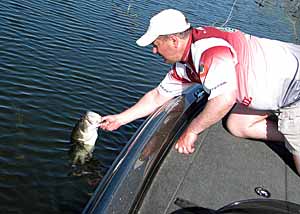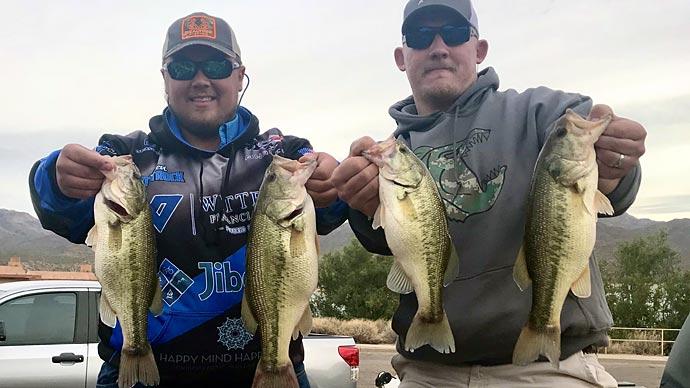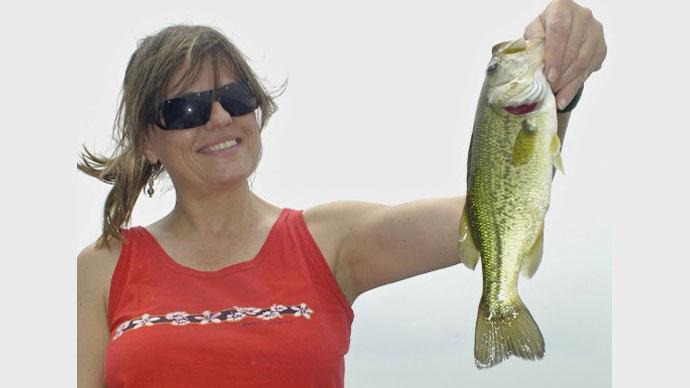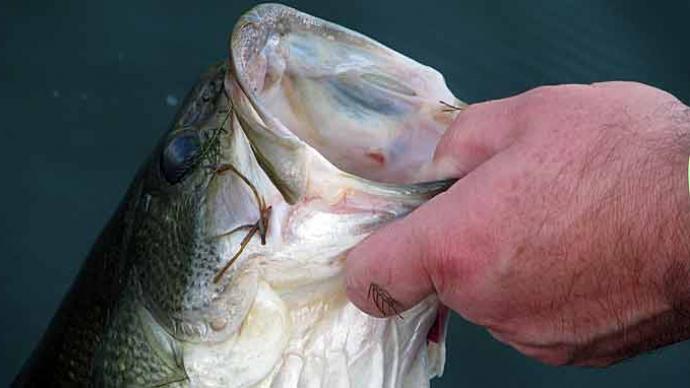
The art of catch and release could be on the verge of becoming the next big concern of fishery managers and biologists. It's already been under scrutiny for some time because keep-and-eat is supposedly missing from "workable" slot limits. Fisheries biologists claim that the only way slot limits work for any lake is for small fish, those under the slot, to be retained in more significant numbers than what is currently in style with bass fishing society (which is practically none).
But they were inclined to support and promote catch and release as part of their fisheries plans and perhaps had hoped to strike some balance between live release and a visit to the table, for bass in particular. No one realized that catch and release would become THE THING TO DO, almost a religious experience, for bass anglers and that such a noble ethic could become a problem for fisheries management.
Ah, but we don't want to kill our little bass. We know that they grow up to become big bass. We believe we are doing the "right thing." But we could be cutting off our noses to spite our faces. The real question is, are we practicing catch-and-release or reverse selective harvest?
Studies indicate that long-term catch-and-release fishing can indeed negatively impact a fishery. Smaller, more aggressive fish deplete the food resources of a take faster and more efficiently than larger fish. According to biologists, these fish take more forage for their size than they're worth to the lake in recruitment. That equates to larger fish with less to eat and not growing as fast as they could under optimum conditions with plenty to eat.
In studies by the Department of Fisheries and Aquatic Sciences at the University of Florida in 1999, scientists discovered detectable differences in proportional stock density in response to size limits in both largemouth bass and crappie. This gave fisheries managers a heads-up on how well-imposed limits were working and why some were not working as well as they should under the conditions provided (which included catch-and-release fishing).
It's even possible that catching and releasing fish in large numbers may stimulate an evolution of sorts in fish. We could be helping them learn to avoid being caught again. The studies on "smart" bass indicated that fish caught on a lure can learn from the experience and not be as easily caught again. Bass behavior studies provide some facts about what bass can learn and remember and what kind, if any, problem-solving abilities they have.
And those abilities have proven fairly convenient for bass, less convenient for bass fishermen. However, noises and what bass see can be associated by them with danger. Though they don't necessarily "think" like humans, they can learn that a specific lure or sound means danger. Yet they might still hit a lure of a different color or type as it has not yet been associated with a similar danger, which is, of course, why lure manufacturers are in the catbird seat of this sport. Creating new baits and new colors is to their advantage in selling more baits, but it is also needed by anglers to continue to "trick" bass into biting them.
Bass have indeed evolved and continue to evolve in the same manner that other creatures have to maintain their place in the environment in which they live. They are familiar with their environment and the things threatening their survival. They have become more adept at recognizing what looks "real" and what does not, even though eyesight isn't their best sense.
Bass live by their instincts. Those instincts include knowing where they are, where they're going, what foods they prefer and where to find them, and avoiding "known" dangers. In addition, spawning instincts tell them when the time is right to seek out the same places they went the year before to participate in the annual ritual.
Fish do know where they are and where they belong regarding territory. In studies done by fish tracker John Hope, the fish he followed always found their way back home after being released at a tournament site following weigh-in or after being released by individuals, even if that took several days or weeks.
Small fish can more easily be caught again shortly after being caught, as was found when under-the-slot fish were transported from Lake Fork to Sweetwater in west Texas. During the Honey Hole BCA Show-down held at Lake Fork some years ago to alleviate the numbers of small bass in the lake (to follow a biologist's directive that small fish needed to be removed), fish were held in livewells during the event, transferred to holding tanks, then shipped to several different lakes and released. An angler bank fishing at Sweetwater caught several of them the next morning after they were released following the transport. This indicates a couple of things. First, fish can survive quite an ordeal, but second and more important, smaller fish (those under 14 inches) are far more aggressive than larger ones. They haven't "learned" very much about lures yet, and any fear they might have is overridden by hunger.
As in all species, humans included, intelligence in the form of instincts is handed down from one generation to the next. Some bass are likely "smarter" than others. And size doesn't have much to do with whether they're smarter or dumber. A big bass didn't necessarily get that way from being smarter. That may have had as much to do with genetics as intelligence. However, at least some portion of its size is related to its intelligence since it had to avoid being caught by anglers that don't practice catch and release to grow that large.
Biologists believe that for slot and high-end limits to work correctly, bass in the smaller classes (under the slot) must be harvested at a higher rate than currently popular. But can we now go back and relearn the art of fisheries management? Can we bring ourselves to understand that conservation also means selective harvest? Is there reason to believe that removing large, lure-educated bass may be helpful?
You can do your part to help. Take home some smaller fish, those under the slot, a couple of times each year. And don't be ashamed of keeping a larger one to mount. Even if you have been a diehard catch-and-release angler, you'll have to rethink what conservation is all about. Not every little fish released will grow up to be a big bass, and not every large bass removed causes harm to the fishery. Noble ethics may not protect our fisheries after all, but sensible management will.
On the other side of the scientific debate, Key Puckett of Fishin' World in Dallas has some interesting thoughts on catch-and-release fishing. Certainly, no biologist. He's got what you might call "street sense." He's a fisherman and believes there are other reasons we're not catching as many fish as we used to.
Puckett has competed in tournaments for many years and still does in fresh and saltwater. He says in 1973, all he could think about was fishing tournaments, which in his opinion, is what built bass fishing.
"For years, my only pleasure in fishing was in tournaments. However, in the last 10 to 15 years, I've seen a decline in the catch-per-unit effort and participation in the sport. And if you look at license sales, they have also declined. Texas is selling licenses presently like it did in the 70s. That's about a 50 percent decline in participation. I keep asking myself why. I think the key is that we are urbanized. We are a more affluent society. People can "do" more things now than ever before. I believe we're not gaining new fishermen or young ones (the average age is 48 or 49 years old of licensed fishermen) because there are too many choices, and it isn't as much fun as other things.
"The fact is that it's challenging to go out and catch black bass. The people who fish tournaments know how to catch bass and are happy with four, five, or six bites a day, but it isn't pleasurable for kids or those who are just getting into the sport.
"I believe it now takes more ways to catch fish because of catch and release. The same fish are being caught, and they're becoming more educated. The same fishermen don't buy the same baits because the fish won't hit them. TPW wanted a world record, so they helped promote catch and release. We've come close, but what are the chances of an angler catching one of those? We'd be better off with more one- to three-pound fish to keep fishermen interested.
"Catch-and-release has helped to develop big fish. There have been excellent catches of five fish weighing 40 pounds or more. Fork, Richland- Chambers, and other lakes have produced incredible catches, but the new guy who goes and buys a bass boat and goes fishing seven or eight weekends and catches only four fish sells the boat and changes hobbies to golf or whatever.
"In many of our lakes, catch-and-release has hampered the ability of a new angler to go home and say they did some good. We've become over-zealous in our conservation efforts, the complete opposite of 20 years ago when we took home ice chests of fish to show to everyone.
"There needs to be more excitement to fishing to bring new people to the sport. We may have to eat some fish again to harvest out the ones that are smart enough not to get caught. People must be able to catch a lot of fish, not necessarily a monster bass, just enough to keep them interested.
"Big fish trained not to bite lures need to be removed from the lake. To substantiate how catch and release can work, look at Sam Rayburn. It is estimated that most of the bass over six pounds died from the largemouth bass virus. Since the kill, small fish are growing, and Rayburn is alive with two- to four-pound bass. Limits are being caught again. Fishermen can catch eight to 20 keepers a day. There are a lot of aggressive, young fish biting again in the lake. But if all these fish are released repeatedly, it will most likely become more challenging to catch fish without another kill occurring.
"Look at the striper fisheries at the best lakes. These fish are replaced more often because the fish are removed, which means a less wary and knowledgeable fish replaces one that has been caught several times. If you had a lake full of large stripers which had been caught over and over again, then fishing would become difficult."
We need more excitement in the sport to attract new anglers and keep some involved who have become disenchanted with poor fishing. Of the essential elements of fishing, it must first be fun. Plenty of "catchable" fish must be in most of our lakes. There must be places where people can find folks who can help them learn about fishing. Fishing was never intended to be "fast food," and as we lose the small tackle shops where there was an intimacy and sharing of knowledge, so go the license sales to new anglers. There shouldn't be issues about such things as live bait or keeping fish if you want to for dinner or mounting. Each person paying for a fishing license should fish according to their morals. It must also be affordable, accessible, and obtainable in some form for people of all economic standards. It also shouldn't be so confusing with dozens of limit variations.
TPW doesn't have to spend millions of dollars designing the world's biggest "super bass" to make fishermen happy or get new ones to come to the sport. They need to improve overall fishing so that a new angler can catch enough fish to be encouraged to participate in the sport.
Seasoned anglers have grown accustomed to three bites a day and accept it as part of bass fishing. There's plenty of grumbling about poor fishing but less understanding about why and no workable ideas from TPW about how to change it.
Striking a balance between total catch and release and a more natural selective harvest won't be easy. Everyone can't change their ethics all at once, rush out and start keeping every fish they catch. But somewhere along the way, a compromise must be found. As to inducting new fishermen into the sport to keep the economy flowing and growing, that's a lot of work. But I believe Key had it right. To get more fishermen, there must be more "catchable" fish. And they don't have to be 18-pounders. Perhaps TPW should direct less attention to "designer" bass and more to many dumb ones that can be caught. Then the guy who buys a bass boat will keep it and continue to fish.



